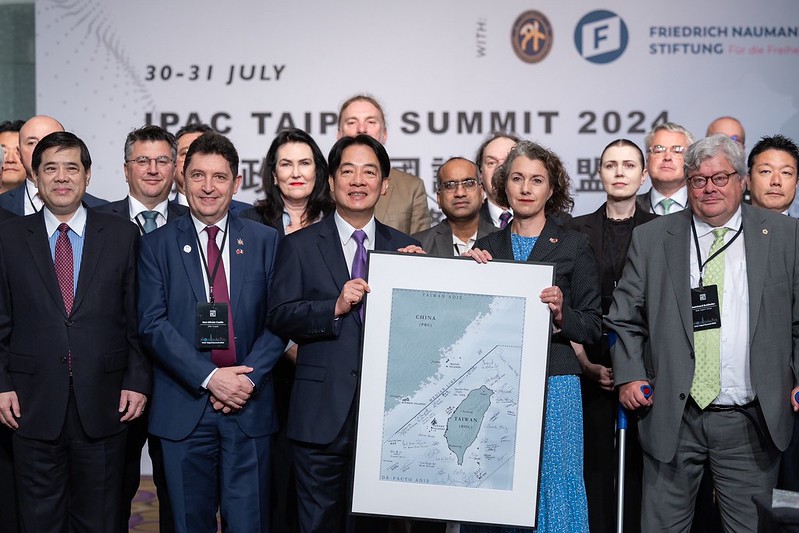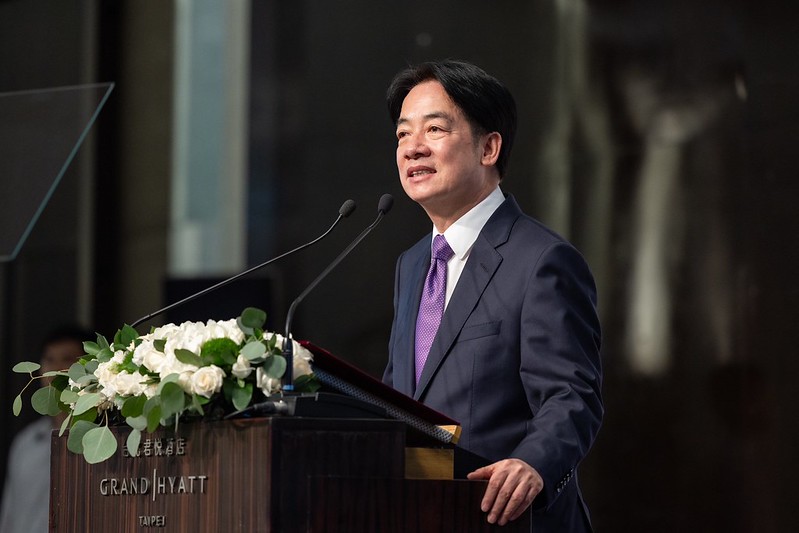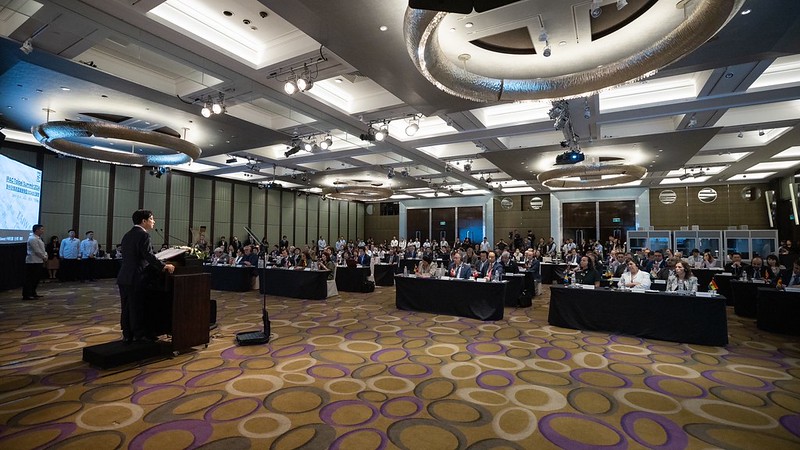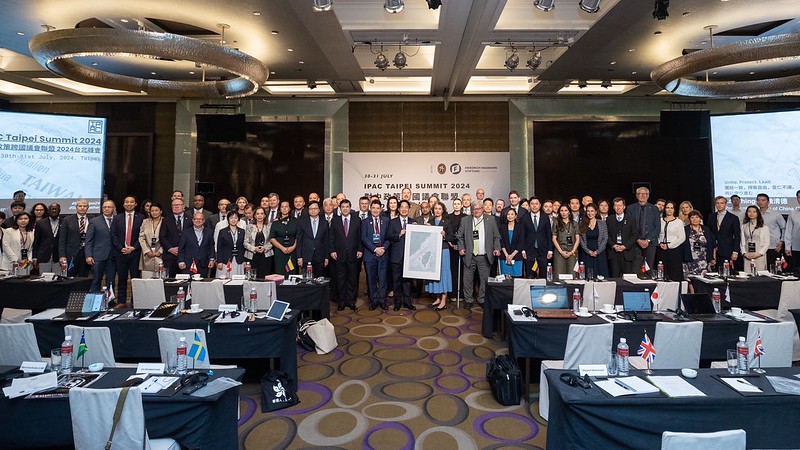News & activities
 News releases
News releases
On the afternoon of July 30, President Lai Ching-te delivered a speech titled “Taiwan’s Global Vision” at the annual summit of the Inter-Parliamentary Alliance on China (IPAC) in Taipei. In remarks, President Lai thanked the largest ever multinational legislative delegation for demonstrating their nations’ consideration and support for Taiwan. The president emphasized that as Taiwan stands on the frontline of the democratic world, we are determined to defend our democracy, and we are firmly committed to working together to maintain regional peace. He said that Taiwan will use its full strength to support the democratic umbrella with our partners in democracy so we may avert the threats of expanding authoritarianism, as we work together for democracy, peace, and prosperity.
President Lai stated that Taiwan will take as its guide our Four Pillars of Peace action plan, which includes strengthened national defense; improved economic security; enhanced cooperation with other democratic countries; and stable and principled cross-strait leadership. And democratic Taiwan, he said, where we will all work together in unity, can contribute so much more to the world. Emphasizing that Taiwan needs the world, just as the world needs Taiwan, the president said that as we continue to stand united, we look forward to working in concert to create a better future.
The following is a translation of President Lai’s remarks:
Distinguished lawmakers from IPAC: Welcome to Taiwan. Since its founding in 2020, IPAC has staunchly supported Taiwan. In the legislatures of your respective countries, as well as in the European Parliament, you have each played a key role in promoting resolutions and bills in support of Taiwan. Whenever Taiwan faces threats from China, IPAC stands with us, speaks up for us, and gives us its full support. On behalf of the people of Taiwan, I extend sincere gratitude to you all.
It is very meaningful that this year’s IPAC Summit is being convened in Taiwan. Altogether, 49 lawmakers and high-ranking officials from 23 nations and the European Parliament have defied pressure and traveled a great distance to be here. This is the largest ever multinational legislative delegation to visit, demonstrating your nations’ consideration and support for Taiwan. Your visit also sends an important message to our democratic partners around the world: We must come together for democracy, and democracy must be defended. Your actions are proof of your willingness to fight against expanding authoritarianism.
Given our strategic position in the first island chain, Taiwan stands on the frontline of the democratic world. We are determined to defend our democracy, and we are firmly committed to working together to maintain regional peace. We believe very deeply that peace and stability in the Taiwan Strait are vital for democratic, peaceful, and prosperous development throughout the world.
In recent years, China’s military expansionism in the East and South China Seas has not only been seen through military exercises in the Taiwan Strait, but also in joint sea and air drills with Russia in the South China Sea and Western Pacific. Just this month, a joint declaration by NATO leaders named China “a decisive enabler of Russia’s war against Ukraine.”
China’s outward expansion of authoritarianism is evident through its military intimidation of neighboring countries, and through tactics including diplomatic suppression, economic coercion, cyberattacks, and the spreading of disinformation. Their continuously escalating gray-zone aggression undermines regional peace and stability.
China’s acts to expand power often come through lawfare and the distortion of history. Laws should serve as a line of defense for fairness and justice. History should serve as a mirror for introspection – not as an excuse for aggression. The United Nations General Assembly Resolution 2758, which you will all discuss shortly, is a notable example of this.
I would now like to take this opportunity to extend special thanks to the United States government, European Parliament, and friends in the international community for passing resolutions or making public statements opposing China’s misinterpretation of UNGA Resolution 2758. By making improper links with its “one China principle,” China uses the resolution to try to restrict Taiwan’s international participation and falsely construct a “legal basis” for the use of force against Taiwan.
I want to emphasize that a threat by China to any country is a threat to the whole world. Taiwan will use its full strength to support the democratic umbrella with our partners in democracy so we may avert the threats of expanding authoritarianism. We all have a commitment to the global community to work together for democracy, peace, and prosperity. This is also Taiwan’s global vision.
And we will strive to realize that vision with our Four Pillars of Peace action plan as our guide.
The first pillar of our plan is strengthened national defense. We will continue to enhance our self-defense capabilities, facilitate external military procurement, create mechanisms through which we can adopt emerging technologies, and build up our civil defense system. Last month, I announced that we are establishing the Whole-of-Society Defense Resilience Committee at the Presidential Office to strengthen the resilience of our entire society and build up our ability to respond to various challenges.
Just last week, Taiwan held its nationwide military exercises for defensive operations. The focus this year was unscripted, realistic scenarios, which tested the response capabilities of our military and demonstrated our resolution to defend our nation.
The second pillar is improved economic security. Taiwan excels in technology and innovation, and our semiconductor industry leads the world. These are Taiwan’s strengths; these are also our responsibilities. Taiwan will continue to cooperate with like-minded nations on “democracy chips,” as we build sustainable semiconductor supply chains to advance global prosperity and development.
We also look forward to Taiwan further deepening its economic and trade ties with other countries through such pathways as joining the Comprehensive and Progressive Agreement for Trans-Pacific Partnership (CPTPP), signing an economic partnership agreement with the European Union, and moving forward with negotiations for further agreements under the Taiwan-US Initiative on 21st-Century Trade and the Enhanced Trade Partnership arrangement that we signed with the United Kingdom. All of this will help us jointly create an even more successful economy.
The third pillar is about standing side-by-side with other democratic countries to demonstrate the strength of deterrence, prevent war by preparing for war, and achieve our goal of peace through strength.
Last month we saw the G7 leaders issue a communiqué in which they reaffirmed that “maintaining peace and stability across the Taiwan Strait is indispensable to international security and prosperity.” It also, for the first time, included support for Taiwan’s meaningful participation in international organizations. In addition, IPAC launched its Operation MIST this year, the purpose of which is to help countries become aware that a shock in the Taiwan Strait could have economic consequences far more profound than those from Russia’s invasion of Ukraine or the COVID-19 pandemic.
So, we want to express our sincere thanks. And we also want to say that we will continue to push for Taiwan’s international participation so that we can make even more contributions to the international community on such issues as a secure global supply chain, public health, and climate change.
The fourth pillar is stable and principled cross-strait leadership. We know that many of our friends around the world have a keen interest in cross-strait relations. As a responsible member of the international community, Taiwan will do its utmost to maintain regional peace and stability. We will neither yield nor provoke, and we will maintain the status quo. And we are willing, under the principles of parity and dignity, choosing dialogue over confrontation and exchange over containment, to engage in cooperation with China. In that way, we can decrease conflict and achieve peace and stability in the Taiwan Strait.
The action plan I just outlined will be realized through the collective efforts of our people. And democratic Taiwan, where we will all work together in unity, can contribute so much more to the entire world.
Taiwan needs the world, just as the world needs Taiwan. Advancing democracy, peace, and prosperity is our common goal. So, once again, I want to thank everyone for their strong support of Taiwan. As we continue to stand united, we look forward to working in concert to bring our vision into reality and create a better future. Thank you.
UK Member of Parliament Sarah Champion, the current IPAC chair under its rotating system, as well as many senior officials from various countries also attended the event.












